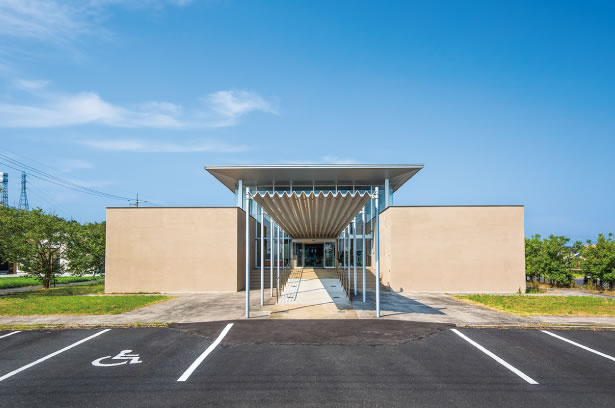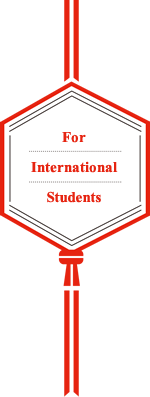Japanese Language Program

Japanese language advancement 2-year courseStudy period: 2 years [Entrance in April]
Japanese language advancement 1-year 6-month courseStudy period: 1 years and 6 months[Entrance in October]
| Class time | 5 days a week (Mon to Fri) |
|---|---|
| Class time | Morning class: 9:00 to 12:30[2nd year], Afternoon class: 13:20 to 16:50[1st year] |
This is a Japanese language course that is a maximum of 2 years aimed at advancing to a university/graduate school or professional college in Japan.
As a course for acquiring comprehensive Japanese language proficiency, students improve the 4 Japanese language skills of reading, writing, speaking, and listening in an overall manner, while also doing fieldwork and research presentations, and practicing speeches.
We also provide measures for the various tests required for higher education (Examination for Japanese University Admission for International Students, Japanese-Language Proficiency Test, etc.) and prepare for entrance examination for students such as interview instructions.
Students aim for a level of passing the N2 Japanese-Language Proficiency Test.
Care giving advancement courseStudy period: 1 year [Entrance in April]
| Class time | Class time: 5 days a week (Mon to Fri) |
|---|---|
| Class time | Class time: Morning class: 9:00 to 12:30 |
This is a 1-year Japanese language course aimed at advancing to a Care Worker Program (2 years) at Trinity College, Izumo Medical Care and Welfare Professional Training College or Trinity College, Hiroshima Medical Care and Welfare Professional Training College.
Along with comprehensively learning the 4 skills of reading, writing, speaking, and listening in a balanced manner, students learn the Japanese language with particular focus on the conversation skill necessary in care giving workplaces.
Furthermore, to ensure students do not hesitate when advancing to the care worker program, they tour facilities for the elderly and people with disabilities and learn welfare terminology (including laws) as preparation, and also experience actual classes of the care worker program several times a year.
Along with learning the training for a first-year care worker, students aim for a level of passing the N2 Japanese-Language Proficiency Test, and after advancing to higher education, aim to acquire the national qualification for care workers and to find employment in Japan with the "care work" status of residence.





Difference Between the Japanese-Language Proficiency Test (JLPT) and Examination for
Japanese University Admission for International Students (EJU)
The Japanese-Language Proficiency Test (JLPT) is implemented in July and December each year to measure general Japanese language proficiency.
To people advancing to a professional college, university, or graduate school, people who want to work in Japan, and people who want to work using Japanese in their home countries, the Japanese-Language Proficiency Test is the perfect test "for proving one's Japanese language ability."
On the other hand, the Examination for Japanese University Admission for International Students (EJU) is implemented twice a year, in June and November, to measure one's Japanese ability to handle studying at a university or the like in Japan.
95% of national universities and 65% of public universities require foreign students to take the Examination for Japanese University Admission for International Students in entrance tests for undergraduate programs.
Also, 44% of private universities require taking the Examination for Japanese University Admission for International Students.
As for the composition of test questions, the EJU has short-answer questions, but the JLPT does not.
Conversely, the JLPT has questions on linguistic knowledge (characters / vocabulary / grammar), but the EJU does not have questions that directly test linguistic knowledge.
Also, regarding the sections where the two tests have the same question format, namely, reading comprehension / listening comprehension and listening-reading comprehension (listening comprehension on the JLPT), each test has questions that match that test's respective goals.
Curriculum
* The curriculum is subject to change.
| 1st year | 2nd year | |
| April |
Introductory Ⅰ (3 months)Can use greetings and have simple conversations in daily situations. ● [Kanji] About 150 characters Care giving advancement courseBy touring facilities for the elderly and people with disabilities, students understand the work of a care worker. |
Intermediate Ⅲ (3 months)Can read documents and listen to and comprehend general topics and abstract matters. ● [Kanji] About 850 characters |
| May | ||
| June | ||
| July |
Introductory Ⅱ (3 months)Can have simple conversations in daily situations. ● [Kanji] About 300 characters Care giving advancement courseWelfare terminology Ⅰ |
Advanced Ⅰ (3 months)Can read newspaper articles or simple critiques and can listen to the news and comprehend the main points. ● [Kanji] About 1,000 characters |
| August | ||
| September | ||
| October |
Intermediate Ⅰ (3 months)Nurtures conversational competence close to natural speed in daily situations and reading comprehension competence close to the intermediate level. ● [Kanji] About 450 characters Care giving advancement courseWelfare terminology Ⅱ |
Advanced Ⅱ (3 months)Can read newspaper articles and critiques written about a wide range of topics, can listen to and grasp the main points of coherent conversations or news spoken at a natural speed, and can describe one's own thoughts. ● [Kanji] About 1,500 characters |
| November | ||
| December | ||
| January |
Intermediate Ⅱ (3 months)Can read simple documents and listen to and comprehend general topics and abstract matters. ● [Kanji] About 750 characters Care giving advancement courseWelfare terminology Ⅲ |
Advanced Ⅲ (3 months)Can read newspaper articles and critiques written about a wide range of topics, can listen to and sufficiently comprehend coherent conversations or news spoken at a natural speed, and can describe one's own thoughts. ● [Kanji] About 2,000 characters |
| February | ||
| March |
Tuition
- Japanese
language
advancement
2-year
course Annual Screening fee Entrance fee 1st
semester tuition2nd
semester tuitionTotal
annual paymentTotal payment Teaching materials cost /
Insurance1styear 15,000 JPY 100,000 JPY 350,000 JPY 350,000 JPY 815,000 JPY 1,515,000
JPY50,000 JPY 2ndyear ─ ─ 350,000 JPY 350,000 JPY 700,000 JPY 50,000 JPY
- Japanese
language
advancement
1-year 6-month
course Annual Screening fee Entrance fee 1st
semester tuition2nd
semester tuitionTotal
annual paymentTotal payment Teaching materials cost /
Insurance1styear 15,000 JPY 100,000 JPY 350,000 JPY 350,000 JPY 815,000 JPY 1,165,000
JPY50,000 JPY 2ndyear ─ ─ 350,000 JPY ─ 350,000 JPY 25,000 JPY
- Care giving
advancement
course Annual Screening fee Entrance fee 1st
semester tuition2nd
semester tuitionTotal payment Teaching materials cost /
Insurance1styear 15,000 JPY 100,000 JPY 350,000 JPY 350,000 JPY 815,000 JPY 50,000 JPY
* All amounts include tax. * Transportation fees involved in daily commuting and practicals are to be borne by the student.
* Fees involved in the Examination for Japanese University Admission for International Students (EJU), Japanese-Language Proficiency Test (JLPT), and other qualification tests are to be borne by the student.
Criteria for Eligibility
(1) The student is 18 years old or older.
(2) The student has undergone 12 years of school education outside Japan.
Also, no more than 5 years have passed since the student's last school graduation (the student is not older than 30 years old).
(3) The student has sufficient assets to cover their tuition and living costs while attending the college.
(4) The student's goal in studying abroad and their post-graduation career path are clear.
(5) The student has never been denied after applying for a "student" status of residence from a Japanese education facility other than this school.
- Japanese language advancement 2-year course,
Japanese language advancement 1-year 6-month course Person with Japanese proficiency equivalent to Japanese-Language Proficiency Test N5 or higher, or a person with 150 hours or more of Japanese learning who can verify that with the result notice of an official Japanese-Language Proficiency Test or the like.
- Care giving advancement course
Person with Japanese proficiency equivalent to Japanese-Language Proficiency Test N3 or higher
Scholarships
Japan Student Services Organization, Scholarship for Privately-Financed International Students
| Grantees | Several persons (Varies by academic year depending on the rules set by the Japan Student Services Organization.) |
|---|---|
| Criteria for eligibility | The student has both outstanding schoolwork and character, and has difficulty receiving education due to economic reasons. |
| Provided amount | Monthly amount of 30,000 JPY (Japanese Language Program), Monthly amount of 48,000 JPY (Care Worker Program) |
| Provided period | 1 year |
| Method of application | An explanatory session is held after entrance, and then grantees are screened based on documents. |
| Decision | Mid-June |
Scholarship by the Kyoritsu International Foundation
| Name | Kyoritsu International Foundation Scholarship | Kyoritsu Maintenance Scholarship |
|---|---|---|
| Applicable program | Care Worker Program | Japanese Language Program, Care Worker Program |
| Grantees | 15 students *1 student per school type | 35 students *1 student per school type |
| Criteria for eligibility | Student with nationality in an Asian country with outstanding grades and attendance | |
| Provided amount | Monthly amount of 100,000 JPY | Monthly amount of 60,000 JPY |
| Provided period | 2 years | 1 year |
| Decision | Mid-March | |





